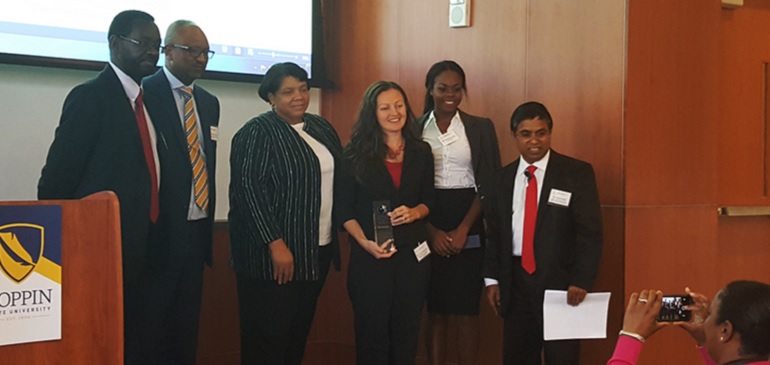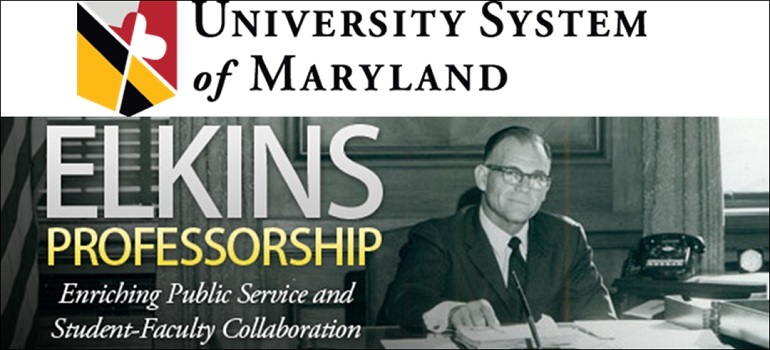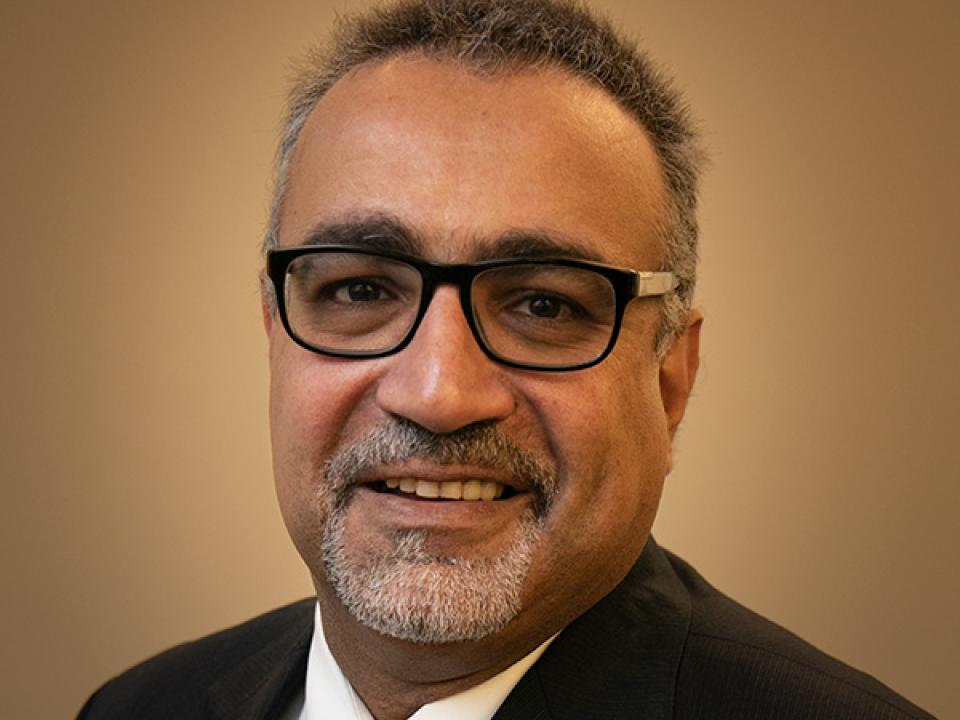Center for Nanotechnology
Grants, Funding and Scholarships
The Center for Nanotechnology at Coppin State University was established in 2007 and it brings together faculty members and students from the College of Arts and Sciences. The center enjoys grant support from the Technology Development Corporation (TEDCO), DOE, NASA, and Undergraduate Education and Research Traineeship (NSF-IGERT) program. The work at the center focuses on experimental research and development in nano and bio technologies as well as on a strong complementary modeling and simulation effort that includes computational nanotechnology, computational nanoelectronics, and computational modeling of processes encountered in nanofabrication. In energy, the interest is on technologies for clean energy generation and storage. Specifically, there are on-going projects in the design and simulation of multi-junction photovoltaic cells for solar energy conversion based on semiconductor materials.
E2-Energy to Educate Grant from the Constellation Energy Foundation
Awarded an E2-Energy to Educate Grant from the Constellation Energy Foundation in the amount of $280,000 over a seven year (2011-2017) period - The ‘E2 Energy to Educate’ grant will grow the next generation of renewable energy students from West Baltimore through a series of educational programs. Students from Coppin State University, Coppin Academy, Bluford Drew Jemison High School, along with other high school students have in the past years explored the properties of solar cells and conducted investigations on the uses and applications of nanomaterials, especially as used in solar cell devices to enhance their efficiency.

E2-Energy to Educate Grant from the Constellation Energy Foundation - 2017
Students will be introduced to concepts associated with renewable energy including basic education in fuel cell technology:. Students will learn the principle of operation of fuel cell and be involved in the fabrication of the fuel cells Fuel Cells in Renewable energy systems: Predominant use of fossil fuel is unappealing due to environmental concerns and depleting fossil fuel. Fuel cells are valuable renewable energy sources as they do not cause any pollution. Students will be exposed to different types of fuel cells namely: Alkali fuel cells, Molten carbonate fuel cells, Phosphoric Acid fuels cells, Proton Exchange Fuel Cells and Solid Oxide Fuel cells. Renewable energy sources for transportation will likely replace fossil fuel sources in the not distant future.
The project will seek STEM careers:
- Develop an infrastructure of renewable energy (solar, wind, geothermal etc.) education among college and high school students
- Develop STEM education for the next generation students from Baltimore area high school thru a series of renewable energy program
- Develop a workface for existing and emerging green energy technology base US industries or companies
- Bring the high-pay jobs of green energy technology to college and high school students
- Encourage the use of renewable energy by the US industries or companies
E2-Energy to Educate Grant from the Constellation Energy Foundation - 2016
There has been an exponential growth in the generation of renewable energy from sources such as Wind and Sun. However, production of energy from these unconventional sources is not continuous: The wind does not blow and the sun does not shine all the time at particular place. The use of energy storage and charge devices is therefore paramount for renewable energy applications such as in transportation. Two hundred forty (240) students form Blueford Jamison STEM Academy (BDJ), Carver Vocational Technical High School, Al-Rahmah High School (ARH), and Coppin Academy High School will be coached by ten faculty, one post-doctoral researcher, one research technician, and thirty students at the Coppin State University (CSU) Natural Sciences and Center for Nanotechnology on energy storage and charging system technologies and how they can be utilized in an environmentally friendly solar light rail. Students will receive hands on training and become acquainted with the energy storage, rapid charging devices, and the construction of a makeshift solar light rail. The above mentioned faculty, staff, and students will mentor students to undertake projects and explore career opportunities in renewable energy technologies.
E2-Energy to Educate Grant from the Constellation Energy Foundation - 2015
The Coppin State University Science and Technology Center will provide opportunities for 200 high school students to explore how photovoltaic energy and dye sensitized solar cells are developed and applied to the real world. Five faculty members and five students at the Coppin State University (CSU) Department of Natural Sciences and Center for Nanotechnology will conduct research on photovoltaic energy and dye sensitized solar cells. CSU faculty and students will mentor and expose 200 high schools students from Coppin Academy High School (CAHS), Bluford Drew Jemison STEM Academy (BDJ), Carver Vocational and Technical High School (Carver), Frederick Douglass High School, and Maryland Academy of Technology and Health Science Charter School (MATHS) students to innovative research on photovoltaic energy and dye sensitized solar cells. The 5 partnered high schools are located within a one miles radius of University. Coppin faculty members and students will mentor 50 high school students (10 from each school) as they design solar energy science projects that will be featured at the CSU 3rd International Symposium on Innovation of Science, Nanotechnology, Human Health and Environment for a Global Society. This summer over 200 scientists and science students from the USA and five other countries participated in the two day symposium on sustainable energy. The 2015 symposium will include interactive presentations and workshops by researchers and scientists with the goal of empowering and inspiring high school students about careers in the energy industries
E2-Energy to Educate Grant from the Constellation Energy Foundation - 2014
The Coppin State University Science and Technology Center will provide opportunities for 200 high school students to explore how photovoltaic energy and dye sensitized solar cells are developed and applied to the real world. Five faculty members and five students at the Coppin State University (CSU) Department of Natural Sciences and Center for Nanotechnology will conduct research on photovoltaic energy and dye sensitized solar cells. CSU faculty and students will mentor and expose 200 high schools students from Coppin Academy High School (CAHS), Bluford Drew Jemison STEM Academy (BDJ), Carver Vocational and Technical High School (Carver), Frederick Douglass High School, and Maryland Academy of Technology and Health Science Charter School (MATHS) students to innovative research on photovoltaic energy and dye sensitized solar cells. The 5 partnered high schools are located within a one miles radius of University. Coppin faculty members and students will mentor 50 high school students (10 from each school) as they design solar energy science projects that will be featured at the CSU 3rd International Symposium on Innovation of Science, Nanotechnology, Human Health and Environment for a Global Society. This summer over 200 scientists and science students from the USA and five other countries participated in the two day symposium on sustainable energy. The 2015 symposium will include interactive presentations and workshops by researchers and scientists with the goal of empowering and inspiring high school students about careers in the energy industries.
E2-Energy to Educate Grant from the Constellation Energy Foundation - 2013
120 students from Coppin State University and Coppin Academy will explore new energy technologies including quantum dot solar cells and nanotechnology. Student will explore how these technologies are developed and applied and what makes them succeed while others fail. Researchers and engineers in solar technology industry will mentor students as they design projects and explore career opportunities in solar technology. At the completion of the project, students will have a better understanding of solar energy technologies as measured by pre-test and post-test, design of solar cell with greater efficiency, and presentation of project results at energy conferences.
E2-Energy to Educate Grant from the Constellation Energy Foundation -2012
225 students from Bluford Drew Jemison STEM Academy and Coppin State University will explore new energy technologies including nanocrystalline solar cell, silicon solar cells, multijunction solar cells, and nanotechnology. Student will explore how these technologies are developed and applied and what makes them succeed while others fail. Researchers and engineers in solar technology industry will mentor students as they design projects and explore career opportunities in solar technology. At the completion of the project, students will have a better understanding of solar energy technologies as measured by pre-test and post-test, design of solar cell with greater efficiency and presentation of project resu lts at energy conference.
E2-Energy to Educate Grant from the Constellation Energy Foundation - 2011
200 college and high-school students will explore the properties of solar cell and investigate how nanomaterials are used to increase the solar conversion efficiency of solar cells. Students will design, simulate, and fabricate new solar cells performance using organic materials, and investigate efficiency improvements with hands-on experimental approach.
Department of Education (SAFRA Title III Grant)
Research work at the Center for Nanotechnology is also partly funded by Department of Education (SAFRA Title III Grant) through Coppin State University.
USM Elkins Professorship Grant

Award to Coppin State University to support the appointment of Dr. Jamal Uddin, associate professor in the Department of Natural Science, as he continues his work with undergraduate and graduate students and Coppin's Science Technology Engineering and Mathematics Center. ($40,000) --- 2014
Award to Coppin State University to support the work of Dr. Jamal Uddin, associate professor in the Department of Natural Sciences and founder and director of the Coppin Nanotechnology Center, with the CSU Science Technology Engineering and Mathematics (STEM) Center. ($65,000) --- 2013
Sustainable Energy Fund Grant for Energypath Conference
Members of the Center for Nanotechnology have been recipients for years of grants and scholarships from the sustainable energy fund for training on various renewable energy projects and participation in energypath conferences.
Department of Defense/TEDCO Maryland Technology Development Corporation Grant
The Center for Nanotechnology received a grant in the amount of $89,000 from the Department of Defense/TEDCO Maryland Technology Development Corporation for a Multi Junction Solar Cell Program
NASA Grant
The Center for Nanotechnology received a grant in the amount of $4000 from NASA to carry out work on the project titled centrifugally stiffened Solar Sails.
Contact Us
Thank you for your interest in the Center for Nanotechnology at Coppin State University. We welcome any questions and feedback you have. If you would like more information on anything you have read about our Center for Nanotechnology, please reach out to the following people:
